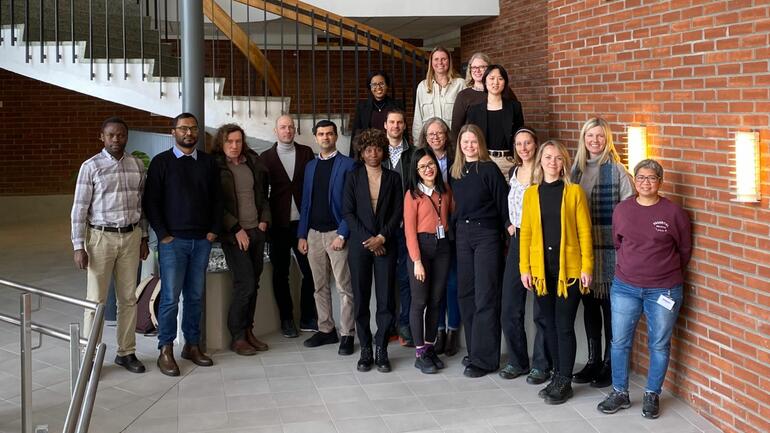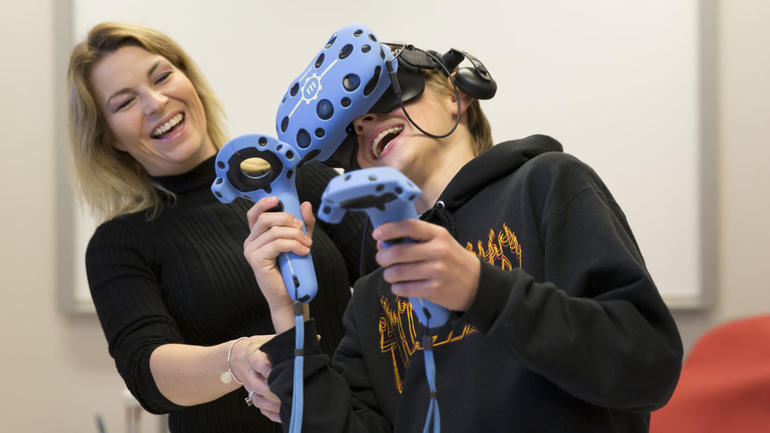I-Merse is an interdisciplinary research group with an aim to advance effective utilization of immersive environments in education, the public and commercial sectors, and society as a whole.
Immersive technologies are beginning to shape our ways of living in a digital age by changing how we consume and process information. These changes will have a far reaching impact on how we live our lives and how we interact with the world around us - the ways in which we communicate, learn, work, shop and play - and will have a profound impact on community and societal interactions . The impending mass adoption of immersive technologies raises fundamental questions about the risks and opportunities afforded by the technology to its users and society as a whole.
Commercially available immersive technologies have developed at a rapid pace over the past decade in both technological capabilities and affordability for consumers.
However, there is a lack of knowledge on how usage may affect some users, ranging from children and adolescents to adults, seniors and persons with disabilities. How do we best design and use these technologies to maximize its benefits while minimizing threats and the introduction of new and potentially unforeseen problems. Our first objective is to explore possible ways of optimizing the use of commercially available immersive technologies for training, learning and understanding behavior among university students. Knowledge and skills suitable for developing experiential learning in immersive technologies and methods for studying behavior in immersive technologies will be investigated.
Research projects involving I-merse
Project 1: The Equitable, Inclusive, and Human-Centered XR Project (XR4Human)
I-merse member involved and role: Rigmor Baraas, Project Coordinator and Rosemarie de la Cruz Bernabe, Co-cordinator
Granting body: European Commission
Go to website: XR4Human -Equitable, Inclusive and Human-Centered XR Project
Project 2: Development of a method for examining and adapting vision correction to optimize the utilization of XR technology in the industrial value chain
I-merse member involved and role: Rigmor Baraas, Project Lead
Project coordinator: Rodenstock Norway
Granting body: Norwegian Research Council, Regional Research Fund: Oslofjordfondet
Project 3: Mapping of universal design XR technology in primary schools
I-merse member involved and role: Rigmor Baraas, Partner
Project coordinator: Norwegian Computing Center
Granting body: The Norwegian Directorate for Children, Youth, and Family Affairs (Bufdir)
Go to website: Mapping of universal design XR technology in primary schools
Project 4: PROSIM – Professional education and simulation-based training
I-merse member involved and role: Astrid Camilla Wiig, work package co-leader
Project coordinator: Norwegian University of Science and Technology
Granting body: The Research Council of Norway
Go to website: PROSIM – Professional education and simulation-based training
Project 5: OpenAR: Framework for augmented reality advanced maritime operations
I-merse member involved and role: Steven Mallam, work package leader
Project coordinator: The Oslo School of Architecture and Design
Granting body: The Research Council of Norway
Go to website: OpenAR: Framework for augmented reality advanced maritime operations
Project 6: Responsible Open Science in Europe Project
I-merse member involved and role: Rosemarie Bernabe, co-coordinator
Project coordinator: University of Oslo
Granting Body: European Commission
Go to website: Responsible Open Science in Europe Project
Project 7: H2020 Project ENHANCE
I-merse member involved and role: Salman Nazir
Go to website: H2020 Project ENHANCE
Project 8: COAST – Centre of Excellence in Maritime Simulator Training and Assessment (COAST)
I-merse member involved and role: Salman Nazir
Go to website: COAST – Centre of Excellence in Maritime Simulator Training and Assessment (COAST)
PhD Fellows Research projects
Project 1: Impact of Mixed Reality Vergence and Accommodation
I-merse PhD Fellow involved: Walter Kibet Yego
The principal supervisor: Ellen Svarverud
Co-supervisors: Rigmor Baraas and Stuart Gilson
Project 2: Professional Learning and Development within Immersive Learning environments
I-merse PhD Fellow involved: Lynn Dittrich
Principal supervisor: Toril Aagaard
Co-supervisor: Camilla Wiig
Project 3: Marketing Management, Consumer behaviour, leadership, decision making
I-merse PhD Fellow involved: Thi Diem My Ta
Principal supervisor: Marit Gunda Gundersen Engeset
Co-supervisors: Karen Stendal and Luk Warlop
Project 4: Marine Engineering, Integrating Motivated Goal Achievement in Maritime Simulator Training
I-merse PhD Fellow involved: Simen Hjellvik
Principal supervisor: Steven Mallam
Co-Supervisor: Salman Nazir
Project 5: Ethics of Immersive Technologies – exploring the links between research, XR, and ethical practice
I-merse PhD Fellow involved: Cristiana-Anca Voinov
Principal supervisor: Rosemarie de la Cruz Bernabe
Co-Supervisors: Rigmor Baraas and Michael Weiss.
Project 6: Virtual team collaboration using Immersive technology
I-merse PhD Fellow involved: Sinuo Wu
Principal supervisor: Karen Stendal
Co-Supervisor: Devinder Thapa
Project 7- Challenges for Human Vision in XR
I-merse PhD Fellow involved: Ieva Krastina
Principal supervisor: Lene Aarvelta Hagen
Co-supervisors: Rigmor Baraas and Ellen Svarverud
Project 8- Optimal lighting for visual performance and safety of cyclists and pedestrians in long bicycle tunnels in Norway
I-merse PhD Fellow involved: Kyungbinn Noh
Principal supervisor: Veronika Zaikina
Co-supervisors: Stuart Gilson and Claudia Trinidad Moscoso Paredes
Collaborative research groups and centers
- Training and Assessment Research Group - TARG
- National Center for Optics, Vision and Eye Care
- Marketing Management
- Embodied Making and Learning
- The Research Group for Learning, Learning Design and Digital Media (Norwegian only)
- Science Center Health and Technology
- eDU - Digitalization and educational quality (Norwegian only)
- LUDO - Learning and education in digital environment (Norwegian only)
- Practice, tradition and technology
- DigTekLab (Norwegian only)
- Color Vision & Retinal Imaging Lab
About the I-merse Research Group
The I-merse Group is an interdisciplinary research group on immersive technology which aims to advance and research on effective, equitable, and humane utilization of immersive environments in education, commercial sectors, public health, industry, and in society as a whole. The group was founded by Rigmor Baraas, Marte Sørebø Gulliksen, Karen Stendal, and Salman Nazir. The four founders plus Rosemarie Bernabe (I-merse's administrative coordinator) constitute the I-merse leadership, with Rigmor as the group leader.
I-merse was founded with strategic funding and commitment from the USN Rectorate and the USN Board, totaling NOK 18M. The funds were allocated for the full three years of the four PhD projects and the 3-year salary of the group's administrative coordinator.

